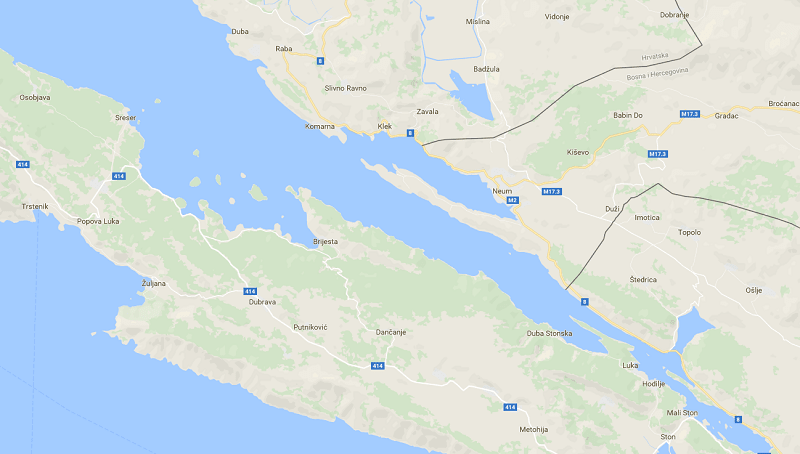Bosnian official says that his country has not given its consent for the bridge to be constructed.
The dispute over the construction of the Pelješac Bridge between Bosnia and Herzegovina (BiH) and Croatia will be reopened, and the international arbitration, similar to the one on the border dispute with Slovenia, is possible. The ruling Bosniak Party of Democratic Action (SDA) will join a request which has been submitted to the Bosnian Parliament by the opposition to halt this project until the sea border issue at the Bay of Neum is resolved, said Halid Genjac, chairman of the SDA Main Committee, reports Jutarnji List on 5 August 2017.
At a news conference in Sarajevo, Genjac stated that BiH had never given its formal approval for the construction of the Pelješac Bridge and that it is not true it would be constructed over the Croatian territorial waters, since the area between Komarno and Pelješac, according to SDA, is actually an area which represents an international corridor for Bosnian access to the open sea. “BiH has never given its consent for the construction of the Pelješac Bridge, without which it would be illegal, and that would constitute a violation of international conventions, and in particular of the United Nations Convention on the Law of the Sea,” Genjac said.
He quoted a position of the Presidency of BiH, adopted at its session held on 17 October 2007, that BiH was against the construction of the Pelješac Bridge “until the open issues related to the sea border between the two states are resolved.” At the time, the BiH Presidency called on Croatia not to take any “unilateral actions” with regards to the bridge construction.
Genjac said that then BiH Presidency Chairman Nebojša Radmanović informed Croatian leadership on 23 April 2009, and then the BiH Presidency later never adopted a decision that would change the standpoint regarding the construction of the Pelješac Bridge.

The fact that representatives of the two countries’ governments and members of expert working groups have in the meantime agreed the changes in the original project is not important, according to Genjac, because the final decision is solely in the hands of the BiH Presidency, and it has not given its consent to anyone to sign intergovernmental agreement on the issue.
He pointed out that it was clear that the question of the sea border has not been resolved and that there was no BiH consent for the bridge construction, which makes it unclear why the European Commission approved the funding for the “illegal” construction of the bridge.
SDA claims that the UN Convention on the Law of the Sea clearly defines the right of BiH to a connecting corridor from its territorial waters to the open sea, which is subject to free navigation regime without any restrictions, including a ban on the construction of artificial structures on such waterways. “It is inaccurate that Croatia is building the bridge in its territorial waters because it is an international connecting corridor,” said Genjac, accusing Croatia that it threatened the national sovereignty of BiH and violated the international legal order.
As a first step towards stopping the construction of the Pelješac Bridge, SDA plans to send letters to Members of the European Parliament, requesting support for the revision of the European Commission’s decision to grant financial aid to Croatia for the construction of the bridge.
SDA demands that the Council of Ministers, led by SDA’s Denis Zvizdić, complies with the decision of the House of Representatives of the BiH Parliament adopted on 5 July, and issues a protest note to Croatia and request the termination of all construction works, including the tender for the construction, until the issue is resolved.
This problem is possible to solve by agreement while respecting international law and BiH’s sovereignty. “If this cannot be resolved in this way, it is entirely possible for BiH to take steps to protect its rights in relevant international judicial institutions,” Genjac said.
The issue of the construction of the Pelješac Bridge resurfaced after the decision of the House of Representatives at the beginning of July. In September, the Parliament is expected to consider a report of the BiH Council of Ministers on plans for its construction.
In recent years, Croatia has accepted all the objections raised by the BiH authorities about the Pelješac Bridge project, which would be constructed at a distance of at least 400 meters from the probable line of demarcation with Bosnia and Herzegovina. The original project was modified so that the height of the bridge was increased to 55 metres, and the distance between pillars to 200 metres, which would allow the passage of even the largest ships to the Bay of Neum.
The Presidency of Bosnia and Herzegovina is currently divided on the construction of the Pelješac Bridge. Bosniak member Bakir Izetbegović has repeatedly stressed that BiH must protect its interests, while Croatian member Dragan Čović believes that the bridge would be beneficial for both states since it would eliminate traffic jams in Neum.
Translated from Jutarnji List.







